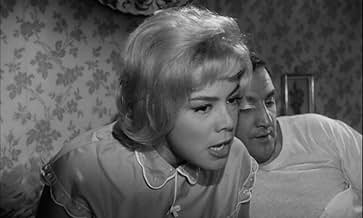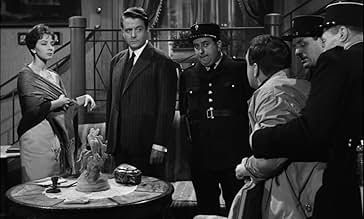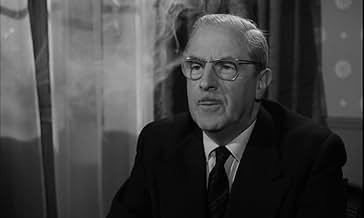Pascal (Lino Ventura) sells newspapers. He is a simple man who one day resting on the banks of the Seine sees a drowning stranger. Pascal saves his life and begins his adventure next to a ma... Read allPascal (Lino Ventura) sells newspapers. He is a simple man who one day resting on the banks of the Seine sees a drowning stranger. Pascal saves his life and begins his adventure next to a man who says his wife wants to intern in a madhouse. No good deed goes unpunished.Pascal (Lino Ventura) sells newspapers. He is a simple man who one day resting on the banks of the Seine sees a drowning stranger. Pascal saves his life and begins his adventure next to a man who says his wife wants to intern in a madhouse. No good deed goes unpunished.
Marc Arian
- Un consommateur
- (uncredited)
- …
Marcel Bernier
- Auguste - le réparateur de vélos
- (uncredited)
Christian Brocard
- Un vendeur de journaux
- (uncredited)
Henri Crémieux
- Le directeur de la P.J.
- (uncredited)
Georges Demas
- Le régisseur du Zoo Circus
- (uncredited)
Marcel Gassouk
- Un livreur de journaux
- (uncredited)
Émile Genevois
- Un vendeur de journaux
- (uncredited)
Gilles Grangier
- Un acheteur de journaux
- (uncredited)
6.7753
1
2
3
4
5
6
7
8
9
10
Featured reviews
entertaining film
The chemistry between Lino Ventura and Robert Hirsch is great to watch. A great movie.
damned be the savior
The year 1959 in which Gilles Grangier's '125 rue Montmartre' was made was not an ordinary year in the history of French cinema. It was the year of the release of films like 'Les quatre cent coups' and 'Hiroshima mon amour', the first of a few consecutive years in which world cinema would be changed by a group of young directors and film theorists, followers of the concept of auteur cinema. Gilles Grangier was also in a period of maximum productivity. He had made the year before 'Le désordre et la nuit' and that year 'Archimède, le clochard', both with Jean Gabin in the leading roles. In '125 rue Montmartre' he casts Lino Ventura in the lead role. It is a thriller drama with a 'film noir' tone but also a moralizing story with dialogues written by Michel Audiard, adapting a novel by André Gillois. Grangier proves in this film that he masters and adopts many of the Nouvelle Vague techniques, but his directorial conception is completely opposite. He seems to be telling his young peers that movies are about and for viewers and are entertainment to take spectators out of the everyday, and not about the filmmakers or vehicles for engaging spectators with social or political messages.
The story takes place in 1959, in an era when printed newspapers were still the main means of information and the job of selling newspapers made it possible to earn a modest but decent living. Pascal is one such newspaper seller, every day he takes a stack of a hundred newspapers, rides his bicycle and sells them on the streets of Paris. After work, he smokes a cigarette on the banks of the Seine. On such a day he witnesses the suicide attempt of a man named Didier. He rescues him and takes him to his home. The man tells him about his wife trying to commit him to a mental asylum to get her hands on his fortune. Good soul, Pascal offers to help him, but this decision gets him into big trouble. The good deed will be punished with involvement in a burglary and being accused of a crime he did not commit.
Lino Ventura plays a role in this film that is a bit different from the kind of gangster or tough cop roles that audiences are used to in most of his other films. Pascal is a simple and gullible man who reacts violently when bad things happen to him, but who wouldn't react violently in his situation? The charm of this film also resides in the unexpectedly smooth melting of Pascal / Ventura in the surrounding human landscape, but also in the description of the human mosaic and life on the streets, in popular restaurants or at the distribution of newspapers, of a Paris of modest and working people. The contrast with the bourgeois house where dark intrigues and murders take place also has a social undertone, but this is implied and not emphasized. The Paris street and nocturnal scenes are no less interesting than those of the Nouvelle Vague contemporaries, and the sincerity of Ventura's performance is also fresh and natural. Even if Gilles Grangier belongs to a different directorial school, '125 rue Montmartre' is not that far from the revolutionary cinematographic works of 1959.
The story takes place in 1959, in an era when printed newspapers were still the main means of information and the job of selling newspapers made it possible to earn a modest but decent living. Pascal is one such newspaper seller, every day he takes a stack of a hundred newspapers, rides his bicycle and sells them on the streets of Paris. After work, he smokes a cigarette on the banks of the Seine. On such a day he witnesses the suicide attempt of a man named Didier. He rescues him and takes him to his home. The man tells him about his wife trying to commit him to a mental asylum to get her hands on his fortune. Good soul, Pascal offers to help him, but this decision gets him into big trouble. The good deed will be punished with involvement in a burglary and being accused of a crime he did not commit.
Lino Ventura plays a role in this film that is a bit different from the kind of gangster or tough cop roles that audiences are used to in most of his other films. Pascal is a simple and gullible man who reacts violently when bad things happen to him, but who wouldn't react violently in his situation? The charm of this film also resides in the unexpectedly smooth melting of Pascal / Ventura in the surrounding human landscape, but also in the description of the human mosaic and life on the streets, in popular restaurants or at the distribution of newspapers, of a Paris of modest and working people. The contrast with the bourgeois house where dark intrigues and murders take place also has a social undertone, but this is implied and not emphasized. The Paris street and nocturnal scenes are no less interesting than those of the Nouvelle Vague contemporaries, and the sincerity of Ventura's performance is also fresh and natural. Even if Gilles Grangier belongs to a different directorial school, '125 rue Montmartre' is not that far from the revolutionary cinematographic works of 1959.
Pleasant Film-Noir
In Paris, the newspaper seller Pascal (Lino Ventura) is a simple, but honest man respected by his friends. He has a love affair with Germaine "Mémène" Montillie (Dora Doll), who works distributing newspaper to the sellers. One day, Pascal is resting nearby the Sena, he sees a man jumping into the water of the rives trying to commit suicide. Pascal saves him and the man, Didier Barrachet (Robert Hirsch), tells him that he is in unrequited love with his wife, Catherine Barrachet (Andréa Parisy), but his brother-in-law Phillipe Barrachet (Alfred lAdam) and she want to intern him in a mental institution to steal his wealth. Pascal brings Didier home and help him to prove that he is telling the truth. He also visits Catherine that confirms Didier's story. Out of the blue, Didier is murdered at home and Pascal is accused of killing him. But when Pascal looks at the body, the man is not Didier. But the smart inspector Dodelot (Jean Desailly) wants more evidences to blame Pascal.
"125 rue Montmartre" (1959) is a pleasant French film-noir, with Lino Ventura in the role of a good man. The story is sordid, with Robert Hirsch and Andréa Parisy framing the street vendor. Jean Desailly performs an intelligent and witty police inspector that uses his experience to resolve the case. My vote is seven.
Title (Brazil): "O Caso da Rua Montmartre" ("The Case of the Montmartre Street")
"125 rue Montmartre" (1959) is a pleasant French film-noir, with Lino Ventura in the role of a good man. The story is sordid, with Robert Hirsch and Andréa Parisy framing the street vendor. Jean Desailly performs an intelligent and witty police inspector that uses his experience to resolve the case. My vote is seven.
Title (Brazil): "O Caso da Rua Montmartre" ("The Case of the Montmartre Street")
A very good story.
I enjoyed very much this black criminal story.
A newspaper vendor is envolved in a murder story and will fight for his innocence !
The dialogues written by Michel Audiard are very good.
Great performances of Lino Ventura, Dora Doll, Andréa Parisy , Robert Hirsch, Lucien Rambourg (the brother of Bourvil) and Pierre Desailly.
A newspaper vendor is envolved in a murder story and will fight for his innocence !
The dialogues written by Michel Audiard are very good.
Great performances of Lino Ventura, Dora Doll, Andréa Parisy , Robert Hirsch, Lucien Rambourg (the brother of Bourvil) and Pierre Desailly.
Lino Ventura Is The Right Man To Play The Wrong Man
Lino Ventura is an ex-boxer who makes a living as a newsboy. People know him, they like him, he sleeps with Dora Doll occasionally. He sells his papers on the Pont D'Alma, then goes underneath to smoke a cigarette. Robert Hirsch throws himself into the Seine, and Ventura rescues him. Hirsch tells him an incoherent story about being a landowner, lured into a quick marriage with Andréa Parisy. Then the brother-in-law shows up and the two of them drive him mad. He fled to Paris, and tried to kill himself. Ventura is fed up with this after two days and takes him to his home, but refuses to go in. Ventura goes in and Mlle Parisy tells him her husband has tried to kill himself three times. There's no farm. She asks him to get her husband to come back. Ventura returns to Paris, and there Hirsch is, with proof of what he has said. Again, he takes Ventura to the house, telling him about 400,000 francs in a locked secretary desk, and where the key is. Again, Hirsch refuses to go in, so Ventura does, finds the money, only now there's a corpse in the salon, and police, whom Mlle Parisy identifies as her husband. The police arrest Ventura...
It's a well written and performed movie from director Gilles Grangier, a skilled commercial director. He keeps each sequence going long enough to begin to test the audience's patience, then moves on in an unexpected direction, thanks, no doubt, to the prize-winning policier by André Gillois it's derived from. Jean Desailly plays the canny detective well, and Ventura is excellent as a lug in this near-Hitchcockian movie.
It's a well written and performed movie from director Gilles Grangier, a skilled commercial director. He keeps each sequence going long enough to begin to test the audience's patience, then moves on in an unexpected direction, thanks, no doubt, to the prize-winning policier by André Gillois it's derived from. Jean Desailly plays the canny detective well, and Ventura is excellent as a lug in this near-Hitchcockian movie.
Did you know
- TriviaThe bridge where Lino Ventura rescues Robert Hirsch is the Pont de l'Alma. It was rebuilt in the early 1970's. Only The Zouave statue remains of the original bridge. The bridge is near the Pont de l'Alma tunnel where Diana the Princess of Wales died in a car crash on 31 August 1997.
Details
- Release date
- Country of origin
- Language
- Also known as
- Tatort Paris
- Filming locations
- Rue Darcel, Boulogne-Billancourt, Hauts-de-Seine, France(Barrachet's villa at SW corner with Rue Salomon Reinach)
- Production companies
- See more company credits at IMDbPro
- Runtime
- 1h 25m(85 min)
- Color
- Sound mix
- Aspect ratio
- 1.66 : 1
Contribute to this page
Suggest an edit or add missing content

![Watch Bande-annonce [OV]](https://m.media-amazon.com/images/M/MV5BMzI5Y2RhMDQtYjAwNy00MTI3LWE0NGQtZWFhYTkxMzM2MmM2XkEyXkFqcGdeQXRyYW5zY29kZS13b3JrZmxvdw@@._V1_QL75_UX500_CR0)































